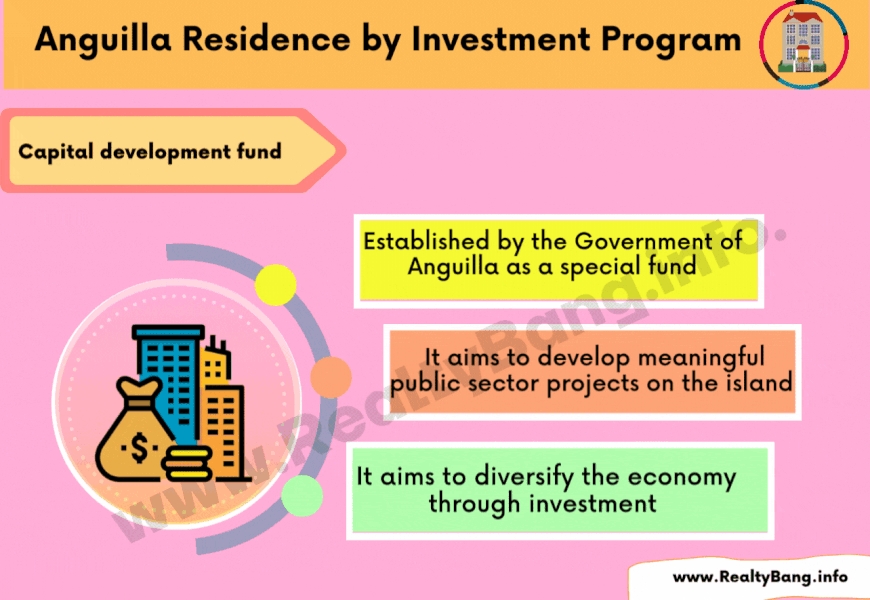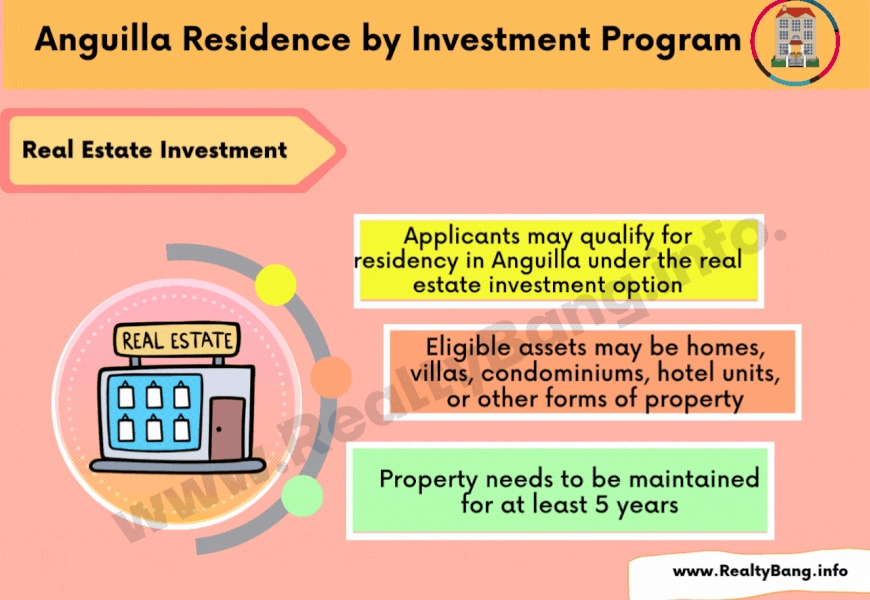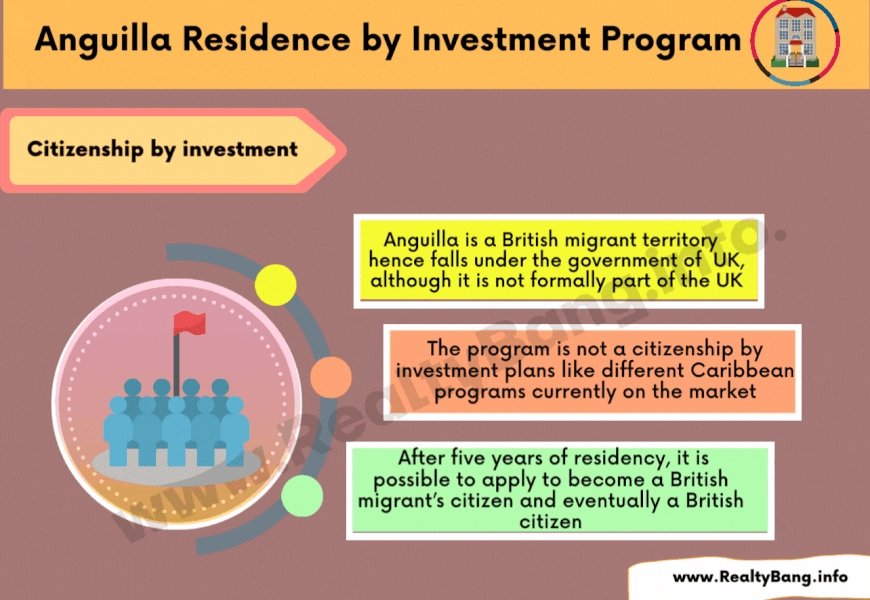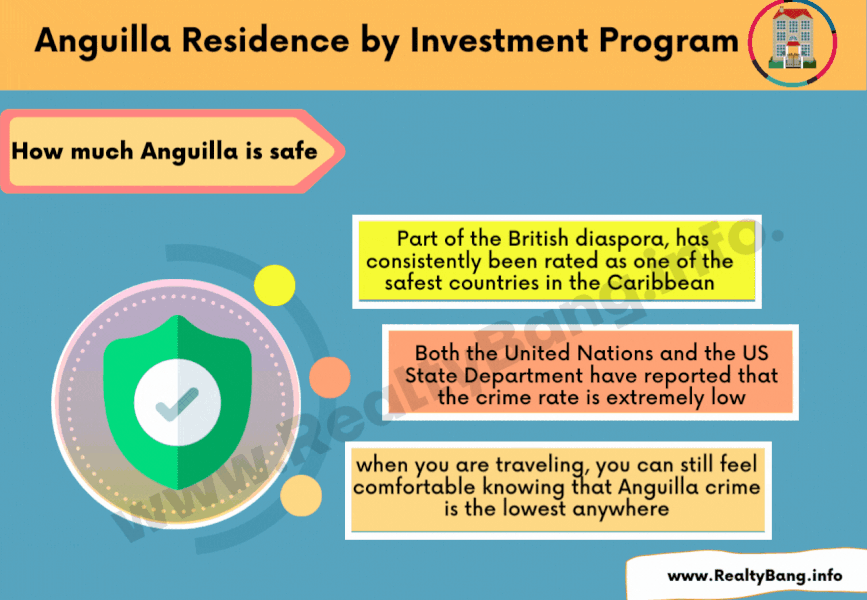Anguilla Residence by Investment Program: This program is attractive to investors seeking a tax-efficient residence. Unlike other Caribbean programs such as St. Kitts and Antigua, the Anguilla program is not a citizenship by investment or another passport program. Applicants may qualify by either investing in a capital development fund or investing directly in real estate.
Just know about Anguilla Residence by Investment Program:
Capital development fund
The Capital Development Fund has been established by the Government of Anguilla as a special fund. It aims to develop and diversify the economy through investment in meaningful public sector projects on the island. The minimum investment is $ 150,000 for the applicant and $ 50,000 for each spouse. Additional application, processing, and due diligence fees apply.

Real Estate Investment
Applicants may qualify for residency in Anguilla under the real estate investment option. This requires a minimum investment of $ 750,000 which would make four family members eligible for residency. An additional $ 100,000 investment is required for each additional family member. Additional application, processing, and due diligence fees apply.
The property needs to be maintained for at least 5 years. Eligible assets may be homes, villas, condominiums, hotel units, or other forms of property. Investors can submit for conditional approval of the application before investing.

Citizenship by investment
Anguilla is a British migrant territory and hence falls under the government of the UK, although it is not formally part of the UK. The program is not a citizenship by investment plans like different Caribbean programs currently on the market. However, after five years of residency, it is possible to apply to become a British migrant’s citizen and eventually a British citizen.

Tax Residency – High-Value Resident (HVR) Program
HVR program applicants can obtain tax residency in Anguilla through an annual payment of $ 65,000. Interested applicants will have to commit to a minimum of five years. The applicant must have owned and maintained property worth more than $ 400,000 in Anguilla during that time.
Why Invest in Anguilla Real Estate
Consistently rated as one of the best islands in the Caribbean, Anguilla is a small piece of paradise that is a close flight from many North American cities. At 14 miles by 3 miles, Anguilla has a population of about 14,000 people. Home to 33 magnificent beaches, soft white sand for your toes, and no shortage of options to jump into turquoise waters. Here are some reasons why investing in Anguilla real estate is a good idea:
Anguilla is safe
Anguilla, part of the British diaspora, has consistently been rated as one of the safest countries in the Caribbean. Both the United Nations and the US State Department have reported that the crime rate is extremely low. Although crimes here are rare, keep your valuables safe.” While you still need to be vigilant and when you are traveling, you can still feel comfortable knowing that Anguilla crime is the lowest anywhere.

Tourist spot
Of the 33 most beautiful beaches you will ever see and the turquoise water is perfect, Anguilla is a prestigious tourist destination. Tourist visits have steadily increased since 2009, and as a result, the villa rental industry is doing very well.

Tax haven
Anguilla is a net tax haven – meaning income tax, property tax, or capital gains tax on individuals or corporations. In addition, Anguilla law strictly protects the privacy of offshore bank accounts and businesses.
Wonderful dishes
Often referred to as the culinary capital of the Caribbean, Anguilla is home to many world-class chefs and restaurants. The island’s 100+ restaurants feature a variety of cuisines. Whether it is Italian food on the beach in Dolce Vita, Mexican in Picante, or inventive cuisine in Via, you will be sure to go home satisfied with great food with high-quality ingredients at various Anguilla restaurants.
Rental yield
Anguilla. The yield is 38.8% higher
Current yields are at least 38.8% for at least 12-bedroom properties located in major coastal areas, particularly the West End, the center of Anguilla’s rental market. This figure applies to short-term leases, typically one week, and takes into account different rates during peak season and off-peak season.
The government has removed the previous rule that foreign-owned property cannot be let out on rent. The purpose of the ban was to prevent tax evasion by non-resident owners. Instead, since 2007, all landowners should be responsible for paying taxes to locally registered representatives.
Taxes and costs
Rental income tax in Anguilla, North America is low
Rental Income: Property rented by tourists incurs a 10% housing tax, which is levied on gross rent.
Property: Property tax is levied at 0.0175% of the assessed value of the property.
Capital Gain: There is no tax on capital gains in Anguilla.
Heritage: There is no inheritance tax on the island.
Resident: There is no tax on income in Anguilla. But stamp duty and fees are levied on certain types of income.
Property Purchase Process in Anguilla
Foreigners, or non-related people, are required to obtain an Alien Land Holding License before purchasing the property.
Despite the license, there are further restrictions on acquiring property. Non-followers can only buy up to half an acre of land. If the buyer wants to buy a larger property, the government of Anguilla requires proof from the buyer that more land is needed. In addition, non-related people are not allowed to own sea-facing properties along sandy beaches.
These are for commercial and tourism purposes. Building a residential house on the prime beachfront is against the law unless the property has 12+ bedrooms. Housing constructed by non-owners should also not be less than 2,000 square feet (square feet) of gross outer floor area.
To be able to rent property; Further permission from the government is required. This is subject to a fee of ECD3,240 (the US $ 1,200) per year.
Steps have been taken to lift restrictions on foreigners owning rental and commercial properties.
The license is a site and buyer-specific document, and cannot be reassigned or transferred. It also clearly identifies the parcel of the property and its intended use i.e. residential or tourism development. Processing of a license usually takes 2-3 months. In this case, it is suggested that the buyer hire the services of a lawyer.
The sale can proceed after the license is issued. The property must be surveyed before transfer. After which, the title must be registered at the local registry office.
There are two important things to keep in mind when purchasing Anguillan property – the sales contract agreement must be carefully drafted (just in case it is not a license). The license should also be read carefully.
Transaction cost table
The round trip transaction cost includes all the costs of buying and reselling the property – attorneys ‘fees, notary’s fees, registration fees, taxes, agents’ fees, etc.
Currency:
Anguilla uses the East Caribbean Dollar (XCD) which is pegged at US1 (USD) to USD1 = XCD2.70.
Alien Landholding License (ALHL):
All foreigners must obtain an Alien Land Holding License to be able to purchase the property. The license fee is 12.5% of the property value. The filing fee for ALHL is ECD1,075.
Stamp duty:
The stamp duty on transfer of immovable property on sale is 5% of the property value.
Legal fees:
Legal fees are negotiable; Most lawyers usually charge 2% of the value of the property.
Real estate agent’s commission:
The agent’s commission is negotiable, typically 2% to 5%.
Know everything about Anguilla Residence by Investment Program at http://www.gov.ai/




